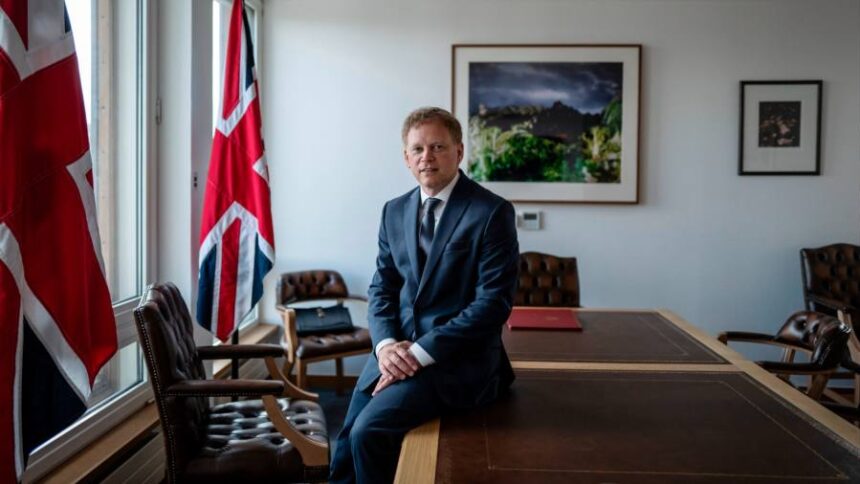Receive free UK energy updates
We’ll send you a myFT Daily Digest email rounding up the latest UK energy news every morning.
Rolls-Royce is in a “good position” to develop technology for a new generation of small nuclear power plants in the UK, according to Britain’s energy secretary, who will on Tuesday launch an international competition for the work.
Grant Shapps told the Financial Times that small modular reactors would help hit the UK’s target of producing 25 per cent of its electricity from nuclear by 2050, up from about 15 per cent currently.
Shapps said British engineering group Rolls-Royce was “obviously in a good position” to build the reactors, having already received £210mn of government grants for its project, but that up to four different technologies could be selected. GE Hitachi and X-energy are among the other companies developing proposals.
He also admitted small modular reactors would not come online until the 2030s, but said by the autumn he wanted a shortlist of “finalists to go through to the final design stage”.
Shapps is seeking to develop nuclear to help reach the UK’s target of net zero carbon emissions by 2050 and said he wanted Britain to have some of the “lowest energy wholesale prices in Europe by 2035”.
He said he hoped to see final investment decisions on small modular reactors in the next parliament. Asked when he thought they might start producing energy, he said: “probably the 2030s”.
The energy secretary will on Tuesday formally launch Great British Nuclear, an arm’s length government body, to oversee development of the new reactors and what he claims will be a nuclear “renaissance”.
Shapps will also announce a grant funding package of up to £157mn to help finance the reactors.
A long-running attempt to get a new UK fleet of nuclear power stations up and running has been dogged by numerous delays and setbacks over the past decade.
Since 2010 only one large nuclear power station has begun construction, at Hinkley Point C in Somerset, led by France’s EDF with investment from CGN of China.
Last week parliament’s intelligence and security committee expressed concerns about Chinese influence in the civil nuclear industry.
But Shapps said he had examined the CGN stake in Hinkley and had been “satisfied” the Chinese involvement was confined to a funding stake, with no access to the project’s technology or infrastructure.
“The Chinese don’t have any access to the tech, to the infrastructure, in terms of the way that it’s built and connected,” he added.
An energy department source said CGN was not involved in any major supply chain contracts at Hinkley Point C, nor was it involved in the instrumentation and controls systems, or any other critical function of the plant.
By contrast, security concerns prompted the government last year to force CGN out of a second planned large nuclear power station that EDF hopes to build at Sizewell C in Suffolk.
EDF and the government now co-own the company behind Sizewell C, which needs to raise nearly £20bn of private funding in a mixture of debt and equity before construction can begin.
The project might not be completed until the mid-2030s, despite EDF embarking on public consultation about the plans in the early 2010s.
Shapps insisted the Sizewell C fundraising was in good shape, saying: “We have been pretesting and I had a brilliant response — really, really positive — speaking to at least half a dozen serious, serious investors.”
Britain’s vulnerability to high gas prices was exposed by Russia’s full-scale invasion of Ukraine, but Shapps said he did not expect the government to subsidise household energy bills again this winter.
Fatih Birol, head of the International Energy Agency, said this month that energy prices could jump this winter, particularly if the Chinese economy strengthened quickly.
Shapps said this was “a concern” but insisted the market had adjusted and forward gas prices made him “fairly confident” subsidies would not be required. “The market indicates we won’t need to go back to that world,” he said.
Meanwhile, he admitted that the Conservative party’s target of decarbonising the electricity system by 2035 was “not easy to achieve”. Energy experts have questioned whether the timetable is realistic, as well as Labour’s earlier target of 2030.
Shapps was bullish about the UK’s ability to compete with the US in the development of green technologies, in spite of President Joe Biden’s $369bn package of subsidies contained in his Inflation Reduction Act.
Shapps claimed Britain had a “10 to 15 year lead on this”, arguing that cross-party backing in the UK for laws and targets to tackle climate change had already drawn in huge public and private investment.
He said Biden was “having to use bungs and tax-and-spend” because of the absence of bipartisan support in the US on laws to fight climate change. “They are dealing with a slightly different problem but we’re going to have a response.”
Chancellor Jeremy Hunt has promised a response in his Autumn Statement and Shapps said planning reforms to facilitate more wind farms would be part of a “holistic approach”.
Shapps said he was also consulting on reforming the government’s “contracts for difference” regime for energy auctions — under which the state typically guarantees renewable power companies a price for their electricity — to support British supply chains.
Shapps met Biden and US climate envoy John Kerry at Windsor Castle this month for talks about climate change convened by King Charles and said he explained how, as energy secretary, he could be sent to jail if he failed to present a plan to achieve net zero emissions by 2050.
He revealed that Biden said he thought this would be a “great idea”, joking: “Finally something we could get bipartisan support for: sending John Kerry to prison.”








